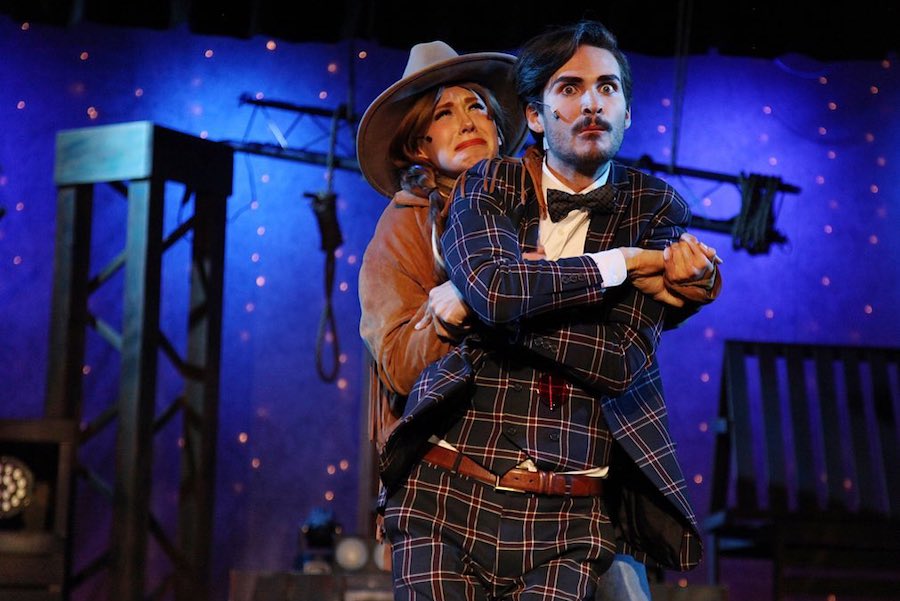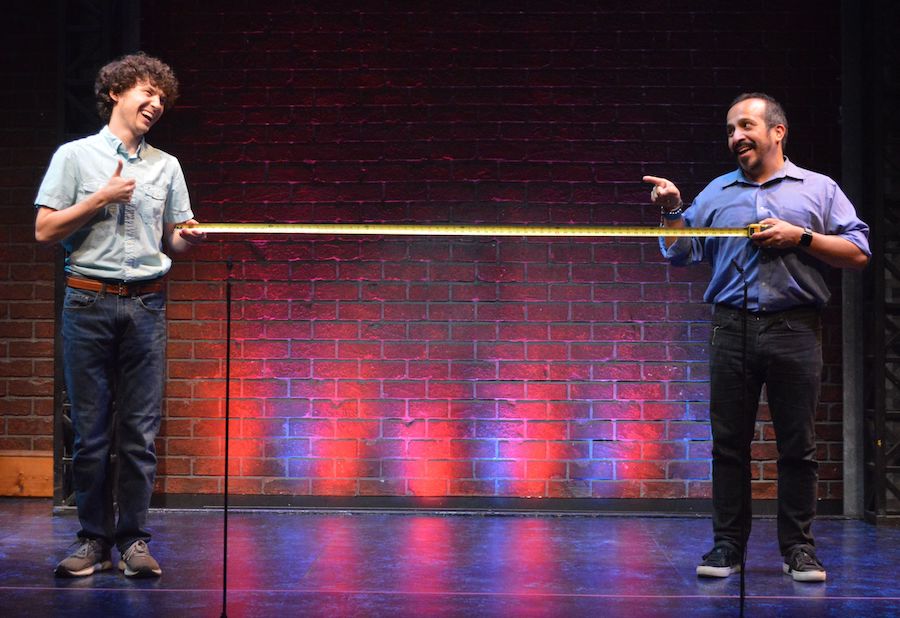While many theatremakers and patrons are mourning summer theatre plans scotched by the coronavirus pandemic, some theatre companies have already calculated the risks, taken precautions, and opened their doors to live audiences. And in states with both high and low caseloads of the coronavirus, some patrons are lining up—six feet apart, of course—for dinner and a show at theatres that offer both. Indeed, the built-in appeal of theatres with on-site restaurants is one factor in these early reopenings; another is the fact that restrictions for restaurants have loosened in many states, while guidelines for theatres remain hazy.
For theatres with Equity contracts, of course, reopening is not in the cards any time soon; the actors’ union recently released four “guiding principles” that would allow for their members to return to work, and the first one—that the pandemic is “under control” in the area—doesn’t seem to apply in many of these cases. The theatre owners and producers we spoke to are going ahead with non-Equity shows anyway, they said, in part because of audience demand, and in part because they think they can strike a balance between taking safety precautions and offering live entertainment.
For the past three weeks, Florida Studio Theatre‘s on-staff improv troupe has been putting its “toe in the water,” as managing director Rebecca Hopkins put it, with dinner and a new one-act comedy show for live audiences, Triple Play. The show features three actors, a piano player, and Hopkins as host, and plays to houses of just 30—a quarter of their venue’s usual capacity. Under Florida’s phase 2 reopening guidelines, restaurants are permitted to open as long as they keep the dining area down to 25 percent capacity, which in the cast of FST’s cabaret space, Browne’s Lab, is just 30. Guests are able to order menu items a la carte at weekend Triple Play performances. The show has been so popular that the company upped its one performance to two this past weekend, building in an intermission and extra content.
The shows have gone on even as this past weekend marked a new record high for coronavirus cases in the Sunshine State. The numbers in FST’s region, near the middle of Florida’s western coast, have followed the statewide trend: Between June 14 and June 20, the Florida Health Department reported a doubling of cases from the week prior, with 195 confirmed cases in Sarasota County. Last Saturday alone, 50 new cases were reported.
Is FST concerned about this? Hopkins outlined a number of steps the theatre has taken to prevent the spread of the virus among the improv troupe, the audience, and the theatre’s 28 staff members, who all voluntarily returned to the office this month. The performers wear masks backstage and in the theatre house, Hopkins said, but remove them onstage. No mics or props are shared, and each performer wears a belt equipped with a bottle of hand sanitizer during the show. The scenes and improv games used in the show have been selected with social distancing rules in mind. As the host, Hopkins will flag when actors get too close—indeed, this social distance policing often makes its way into the skit. The piano player, who is seated behind plexiglass, is a frequent target. “We make jokes about that every week,” said Hopkins with a laugh.
The ticket-taking operates like dinner reservations, with a staffer checking names on a list instead of collecting stubs. In the house, a team is tasked with making sure guests are wearing masks when entering and when they leave their cabaret tables. But while eating and watching the show, guests are permitted to unmask.
“If the audience can’t follow the rules, we can’t do this,” explained Hopkins. “Every weekend I get somebody saying, ‘This is infringing on my civil liberties, but I’m still gonna do it because I know that you have to do it.’” For her part, Hopkins said, she was “very nervous” about returning to performance. For safety reasons, sure, but also because of the limited crowd size. An audience of 30, in pre-COVID times, would have been a disastrous turnout. “That would normally be a failure and the energy in a room would be terrible,” conceded Hopkins.
But the energy in the room has not been low, she said. Instead, she said that in her entire three-decade improv career, she has never experienced an audience like the one that attended the first performance of Triple Play. “That’s one thing theatre has to look forward to, when we are all able to really come back—that energy, that gratefulness, and that excitement to share this experience is overwhelming,” she said. “Those 30 people might as well have been a sold-out house of 100.”
Still, she admitted, the theatre won’t be back to its normal operations—which typically includes a mainstage summer season, since canceled—or audience size for a long time. “This is one of the little things we can do,” she said of the improv show. “We can’t afford the risk of putting up major productions and have everything shut down again.”
Meanwhile, though, about 80 miles south of FST, a large non-Equity cast had been gearing up to open The Sound of Music this week at Broadway Palm Dinner Theatre in Fort Myers, Fla. The dinner theatre, taking the lead from the state’s reopening rules for restaurants, initially reopened in early June to 25 percent capacity with the comedy Love, Sex, and the I.R.S. The theatre had planned to run The Sound of Music from June 25 through Aug. 8, to welcome crowds at 50 percent capacity in its 450-seat theatre. (After this story was published earlier today, the theatre announced a postponement of the show’s opening to July 8.)
Broadway Palm is located in Lee County, which has state’s fourth highest number of COVID-related deaths, with a total of 149. The number of cases in the county as of June 23 is 3,745. But artistic director Will Prather—who had to shut down the Dutch Apple Theatre he runs in Lancaster, Pa., as well as a touring company, in part because other states’ reopening guidelines are stricter than Florida’s—sounded relatively sanguine about packing in audiences again. The theatres he owns and operates, he explained, are classified as restaurants, but he conceded this reopening has been “more challenging,” because “there are really no CDC guidelines or health department recommendations for theatres.”
In the absence of either union oversight or governmental restrictions, Prather’s Broadway Palm will take its own measures to address concerns about the spread of the virus: Tables will be set six feet apart, and food service will be a la carte, not buffet style. Audiences will have temperatures checked upon entering and must wear masks (except while eating, presumably).
Asked about the safety of the cast, Prather noted that Florida Republicans are trying to pass a bill that would not make businesses liable for employees who contract the coronavirus. Only one cast member backed out of the show, he said, and a number of the actors, including the show’s Maria, have traveled in from out of state. The theatre required these out-of-town actors to quarantine for 14 days upon arrival, after which they had a two-week rehearsal period; none of the actors are sharing living spaces, he said, and there’s a full-time company manager charged with overseeing the travel, housing, and quarantine process.
“I’ll be honest with you, this is an experiment,” conceded Prather. “We’re writing our own rule book to the best of our abilities based on all the research and information that is out there.” One adjustment was inspired by a recent article in The New York Times about the danger of spreading COVID-19 through group singing. Prather decided to have cast members record “vocal sweeteners” to supplement group numbers during the live performance, so there won’t be a whole chorus singing at once. And actors will be encouraged to hold back a bit vocally onstage.
And if the virus intervenes? “It’s difficult to get my mind around it,” Prather admitted. “Every theatre and every arts organization in the next six months is going to have to figure out a way to get back into business and a model that’s going to work—and then figure out what you’re going to do when, you know—when you have some sort of virus outbreak.” If that happens during this run, the plan, he said, would be to take a two-week break from performances.

In Utah, another non-Equity musical is entertaining live audiences this month. Pickleville Playhouse, in the resort town of Bear Lake, is located on the border of Idaho and Utah. The theatre falls in a “yellow,” or low-risk county, meaning that theatres there are now permitted to open doors to their full capacity. The musical melodrama Finding the Fickle Fortune opened June 18 and is scheduled to run through Sept. 12. Nightly performances have continually sold out, with a cap of 140 people, and audiences can order food from the Pickleville Grill on site.
But Utah’s recent coronavirus caseload, as in a number of other states, gives some cause for concern: Just 12 days after entering its yellow reopening phase, new cases in the state surged. One third of the state’s new positive cases this month were in the Bear River Health District, which comprises Rich County, where Pickleville Playhouse is located. And while the total number of positive cases in Rich County proper is just three, cases continue to rise statewide. Some health officials are advocating a complete shutdown, but Utah’s governor has no plans to tighten restrictions.
“Utah’s state government has been really proactive as far as setting up plans,” said artistic director TJ Davis, who co-wrote the show. Pickleville Playhouse is following some guidelines: six-feet social distancing between each party and mandated masks for patrons. The theatre is even selling masks as merchandise, with moustaches inspired by the show. Staffers corral groups outside the theatre to stagger entry, and the cap on group seating, according to guidelines from the state, is 50 people.
The show was cast in January with mostly out-of-town actors, though two actors with a high risk for the coronavirus opted out. Davis made sure the cast was comfortable with the theatre’s plans before traveling to Utah. “I said, this is gonna be a little bit more of a risky job than say, you know, going to work on Grandpa’s farm this summer,” recalls Davis. Actors were quarantined in company cabins for two weeks before rehearsals, and are encouraged to stay on the theatre’s premises as much as possible during the production run. Routine temperature checks are performed.
Is he concerned about the safety of singing in an enclosed space? Davis said he hadn’t read the Times piece or other articles about the high risk of group singing. “I mean, I’ve heard of those,” he said. “So it doesn’t look good for musicals, does it?”
If the coronavirus were to appear in Pickleville, he said, the theatre would “shut down until it was safe,” he insisted. The theatre plans to record the show for possible future streaming, but Plan A is for the show to remain onstage in front of live audiences. “Anyone would tell you, revenue running from a streaming show like that is nothing—it will not support the business.”
In one area, though, he conceded that his audiences may not be as ready as Utah’s leaders think they are.
“The government is saying shoulder to shoulder is okay,” Davis said. “We will never go to that this summer, just because we’ve kind of taken the temperature of everyone and it doesn’t feel like they would be really excited about sitting right next to a stranger. But we’ll probably squeeze them in a little bit closer. It’s just the economics of theatre—it’s hard to make any money on half of a crowd.”


